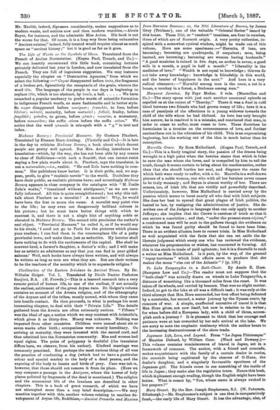Madame Bovary : Provincial Manners. By Gustave Flaubert. Translated by
Eleanor Marx•Aveling. (Vizetelly and Co.)—It is late in the day to criticise Madame Bovary, a book about which decent people are pretty well agreed. But Mrs. Aveling introduces her translation—which, by the way, she has not been able by any means to clear of Gallioisms—with such a flourish, that one cannot resist saying a few plain words about it. Flaubert, saps the translator, is not a naturaiiste,—i.e., realist. "He and Zola have nothing in com- mon." Her publishers know better. It is their pride, and, we sup- pose, profit, to give "realistic novels" to the world. Doubtless they have their public, as realistic pictures have; and accordingly Madame Bovary appears in close company in the catalogue with " M. Emile Zola's works," "translated without abridgment," as we are care- fully informed. All this is quite straightforward ; but why this tall- talk about Flaubert as a moralist P A moralist ! Why, he would have been the first to scorn the name. A moralist may paint vice to the life ; he may even use dangerously brilliant colours in his picture ; but he must have better things with which to contrast it, and there is not a single hint of anything noble or elevated in Madame Bovary. The second title proclaims the author's real object. "Provincial Manners," he called it, as if he would say to his rivals, 'I need not go to Paris for the pictures which please your readers ; I can find them in the commonplace life of a petty provincial town, and make them just as seductive. My heroine shall have nothing to do with the excitements of the capital. She shall be convent-bred, a farmer's daughter, a doctor's wife ; and I will make her as artistic an adulteress as any that you can find in your gilded saloons.' Well, such books have always been written, and will always be written as long as men are what they are. But are their writers to be the teachers of the morality which is to supersede religion ?


































 Previous page
Previous page